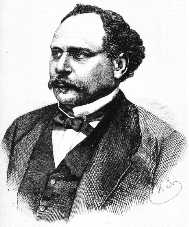Bethel Henry Strousberg

Bethel Henry Strousberg (20 November 1823 – 31 May 1884) was a Jewish industrialist and railway entrepreneur in Germany during its rapid industrial expansion in the 19th century. He cemented his social standing with the construction of the Palais Strousberg in Berlin's Wilhelmstrasse designed by August Orth. Orth was Strousberg's favoured architect and was also responsible for the Görlitzer Bahnhof and renovation work at Schloss Zbirow (now Zbiroh), the centre of the Fiefdom of Zbirow in Bohemia which Strousberg had bought in 1868. The castle is now an hotel and conference venue with guided tours of the restored building.[1]
Strousberg was born in Neidenburg, East Prussia, as Baruch Hirsch Strousberg which he changed to Barthel Heinrich whilst at Gymnasium (Grammar School) in Königsberg in Prussia. After the death of his father he moved to London in September 1839 where he initially lived with his mother's brother Peter Gottheimer who jointly owned a fancy goods business with his brother Lesser. A third brother, Berton Gottheimer, was also in London in the same business.
Strousberg Anglicized his name to Bethel Henry and converted to Christianity. On 13 March 1845 he married Mary Ann Swan at St. Bride's parish church in Fleet Street. In July 1847 Strousberg was working as an agent for several building societies and entrusted to handle member's payments. For some reason, he took an amount of money and booked a passage to America, but was found out when the steamer had to return to Southampton having loaded the wrong grade of coal. Strousberg was tried, found guilty, and served six months imprisonment with hard labour. A year after his release the Strousberg's first son, Bethel Henry Jun., was born; and in January 1849 the three of them travelled to the USA returning in April 1850. Their second son Arthur was born in the autumn of that year.By 1854 Strousberg had become a successful publisher and journalist and was also a manager of an insurance company. Socially he was a Fellow of the Royal Geographical Society.
By the early 1860s he had gone back to Germany and embarked on a second career as a railway entrepreneur and industrialist. From 1867 to 1871 Strousberg was a member of the North German Reichstag for the constituency Königsberg 9, also including Allenstein and Rössel.[2] Though a member of the Prussian Conservative Party he did not join any faction in the Reichstag.[3]
His business empire began a terminal decline during the Franco-Prussian War (1870–71). In 1872, he was forced into liquidation after a ruinous settlement with the Romanian government on account of unfulfilled railway contracts. Strousberg was declared bankrupt in 1875, with Adolph von Hansemann and Gerson von Bleichröder snapping up the majority of his railways for fractions of their worth.[4] After standing trial in Russia for alleged fraudulent transactions with a bank in 1876, he was deported and returned to Berlin, dividing his time between London and the castle in Bromberg whilst attempting his social rehabilitation with various projects and writing his memoirs.[5] He died in Berlin. His Mausoleum is preserved on the Protestant Old St. Matthew's Cemetery in Schöneberg, Berlin.
Bibliography
- Der europäische Eisenbahnkönig Bethel Henry Strousberg, Joachim Borchart, C.H. Beck, Munich 1991, ISBN 3-406-35297-9
- Der Eisenbahnkönig Bethel Henry Strousberg, Manfred Ohlsen, Verlag der Nation, Berlin 1987, ISBN 3-373-00003-3
- Der Eisenbahnkönig, oder, Rumänien lag in Linden : Materialien zur Sozialgeschichte des Arbeiterwohnungsbaus, Wolfgang Voigt, AG SPAK, München SPAK, 1982, ISBN 3-923126-15-8
- Hanomag Lokomotiven, Lothar Spielhoff, Podszun Motorbücher, Berlin 2004, ISBN 3-86133-352-X
- Iron Kingdom: The Rise and Downfall of Prussia, 1600-1947, Christopher Clark, Allen Lane, London, ISBN 0-7139-9466-5
- Aufstieg und Fall des "Eisenbahnkönigs" Bethel Henry Strousberg (Nº 5 in the series Miniaturen zur Geschichte, Kultur und Denkmalpflege Berlins), Horst Mauter, Interessengemeischaft für Denkmalpflege, Kultur und Geschichte der Hauptstadt Berlin, Kulturbund der DDR, Berlin 1981
- The Amazing Dr. Strousberg, Richard Hunt, 2009, ISBN 978-0-9561604-0-9
External links
| Wikimedia Commons has media related to Bethel Henry Strousberg. |
References
- ↑ http://www.zbiroh.com/welcome-to-the-castle-of-zbiroh/
- ↑ Reichstag des Norddeutschen Bundes 1867-1870. Historische Photographien und biographisches Handbuch, Bernd Haunfelder and Klaus Erich Pollmann (compil.), Düsseldorf: Droste Verlag, 1989, (=Photodokumente zur Geschichte des Parlamentarismus und der politischen Parteien; vol. 2), photo p. 323, short biography p. 475. ISBN 3-7700-5151-3
- ↑ Fritz Specht and Paul Schwabe, Die Reichstagswahlen von 1867 bis 1903. Eine Statistik der Reichstagswahlen nebst den Programmen der Parteien und einem Verzeichnis der gewählten Abgeordneten, 2nd ed., Berlin: Carl Heymann, 1904, p. 6. No ISBN.
- ↑ Roth, Ralf & al. The city and the railway in Europe. Ashgate Publishing, 2003. Accessed 9 Sept 2010.
- ↑ Jewish encyclopedia
|